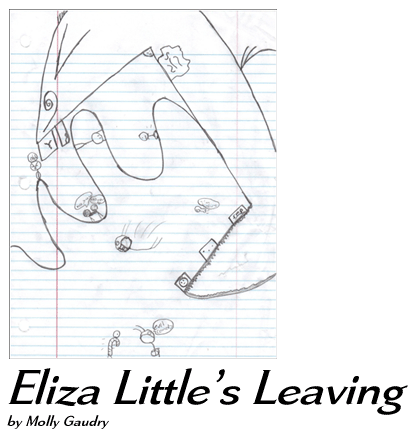
There is nothing funny about moving to the city and a mere year-and-a-half later finding oneself unemployed, broke, and pregnant, but when Eliza Little realizes these facts are no longer fears, she laughs. Things happen for a reason—do they not?—and she has a rich uncle in the country, besides. Eliza calls collect from a payphone, endures a lengthy lecture, and accepts his offer to cover travel costs.
It is spring, and Aunt Alma in the background delights in Eliza’s coming, removes the phone from Uncle Blaine’s hand to say, “The garden’s a disaster! Bring boots and gloves, dear.”
Eliza assures the older woman she can at least do this, and the next morning carries her trunk to the station and holds her finger to the train's frosty double panes as the breaking dawn aways the waking city and welcomes fields of wildflowers wet with dew.
~
Met by Uncle Blaine’s driver, Eliza settles into the backseat and sighs. Roland is young—a boy, really—but quite tall and fair and handsome. He is silent, easily his most endearing feature.
“Thank you,” Eliza says.
Roland nods, eyes fixed on the road. He looks nothing like her baby’s father. For this, she is grateful. His silence awes. His three-piece suit and cap and crisp white gloves are an added bonus.
"I'm pregnant," she says. "What do you think of that?"
He nods, gently parts his lips as if to speak but simply grunts. The sound is a smidge higher than Eliza might have expected, but with a mute like this how could it possibly matter? Designs, incredible designs: she has them!
~
Dark and silent but for crickets, toads, coyotes, the country creeps and Eliza cannot sleep. Her bulging belly spasms, smarts, so the midwife is summoned, sent for as swiftly as the summer storm allows. Uncle Blaine shakes his head again, again. Aunt Alma does her best but flutters like a one-winged moth. Eliza, who has not laughed in weeks, weeps tears that fall like daggers directed at her breast. Regrettably, they fail to pierce, do little more than dampen and annoy. Any moment now a baby she does not want. Any moment now—Push, dear—does it look like she's not pushing?—A little longer this time—how much longer will it take?—push, Eliza, push—and finally, at last—A boy—oh boy! The crickets chirp, toads burp and croak, and Eliza thinks she will never hear the coyotes' distant howls above the wailing of the baby.
Through the window, a breeze so soft Aunt Alma's hair dances. Uncle Blaine's wet cheeks and beard reflect the moon's bright glow. And there it is, simple as Aunt Alma's arms capable of opening wide as the baby's yawn: Yes! Eliza will leave the baby.
~
A day, a week, then "Drive," she says, "just drive."
Only Roland looks back—to meet Eliza's eyes, which she allows but for a moment. A singular sensation, exhilaration mixed with fright and doubt and guilt, coupled with the sight of Roland's disapproving gaze: the combination yields astonishment. Eliza removes herself from stare and car and retreats to the silence of the sleeping baby's room; the absence of his sounds surprises, and how the simple silence confounds! As true as toads croak and crickets chirp and coyotes howl and gardens grow in the country where life goes on and on, Eliza knows for a fact that there is nothing funny about her fears: She can at least do this, the caring for her son. Designs—unspoken, unfulfilled—will get her nowhere. She will leave, simply as Uncle Blaine's beard and Aunt Alma's arms tickle and enfold, but Eliza's drive, not Roland's, must return her to the city she misses so, the hum and drone of traffic horns and pavement slapped by the soles of the shoes of the wearers whose feet traverse the city's streets; it is a different world entirely, but one to which she must inevitably return, and she will, she will, but not without the baby.

